英美文化口语考试话题
英语口语考试常见题目及应答
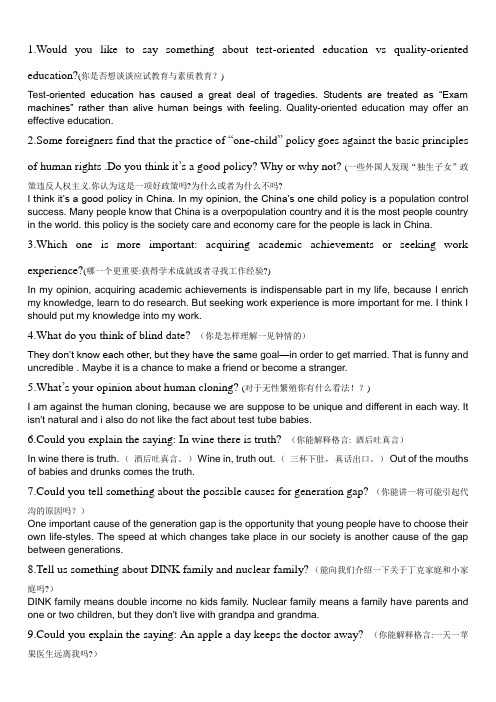
1.Would you like to say something about test-oriented education vs quality-oriented education?(你是否想谈谈应试教育与素质教育?)Test-oriented education has caused a great deal of tragedies. Students are treated as “Exam machines” rather than alive human beings with feeli ng. Quality-oriented education may offer an effective education.2.Some foreigners find that the practice of “one-child” policy goes against the basic principles of human rights .Do you think it’s a good policy? Why or why not? (一些外国人发现“独生子女”政策违反人权主义.你认为这是一项好政策吗?为什么或者为什么不吗?I think it’s a good policy in China. In my opinion, the China’s one child policy is a population control success. Many people know that China is a overpopulation country and it is the most people country in the world. this policy is the society care and economy care for the people is lack in China.3.Which one is more important: acquiring academic achievements or seeking work experience?(哪一个更重要:获得学术成就或者寻找工作经验?)In my opinion, acquiring academic achievements is indispensable part in my life, because I enrich my knowledge, learn to do research. But seeking work experience is more important for me. I think I should put my knowledge into my work.4.What do you think of blind date? (你是怎样理解一见钟情的)They don’t know each other, but they have the sam e goal—in order to get married. That is funny and uncredible . Maybe it is a chance to make a friend or become a stranger.5.What’s your opinion about human cloning? (对于无性繁殖你有什么看法!?)I am against the human cloning, because we are suppose to be unique and different in each way. It isn't natural and i also do not like the fact about test tube babies.6.Could you explain the saying: In wine there is truth? (你能解释格言: 酒后吐真言)In wine there is truth. (酒后吐真言。
英语口语考试经典话题(部分解答)
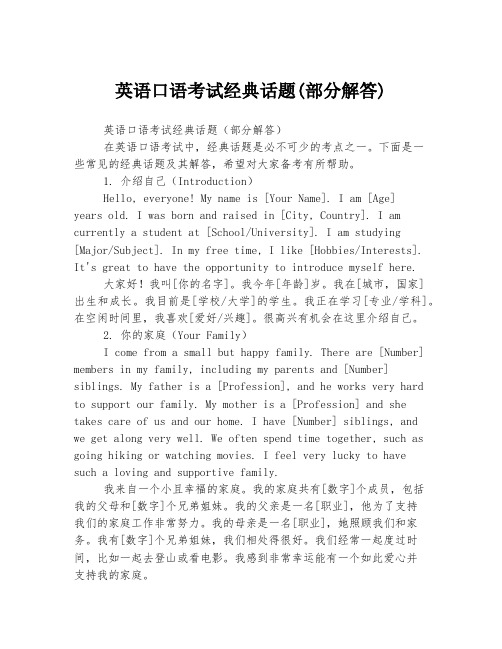
英语口语考试经典话题(部分解答)英语口语考试经典话题(部分解答)在英语口语考试中,经典话题是必不可少的考点之一。
下面是一些常见的经典话题及其解答,希望对大家备考有所帮助。
1. 介绍自己(Introduction)Hello, everyone! My name is [Your Name]. I am [Age]years old. I was born and raised in [City, Country]. I am currently a student at [School/University]. I am studying [Major/Subject]. In my free time, I like [Hobbies/Interests]. It's great to have the opportunity to introduce myself here.大家好!我叫[你的名字]。
我今年[年龄]岁。
我在[城市,国家]出生和成长。
我目前是[学校/大学]的学生。
我正在学习[专业/学科]。
在空闲时间里,我喜欢[爱好/兴趣]。
很高兴有机会在这里介绍自己。
2. 你的家庭(Your Family)I come from a small but happy family. There are [Number] members in my family, including my parents and [Number] siblings. My father is a [Profession], and he works very hard to support our family. My mother is a [Profession] and she takes care of us and our home. I have [Number] siblings, and we get along very well. We often spend time together, such as going hiking or watching movies. I feel very lucky to have such a loving and supportive family.我来自一个小且幸福的家庭。
英语口语考试话题250例
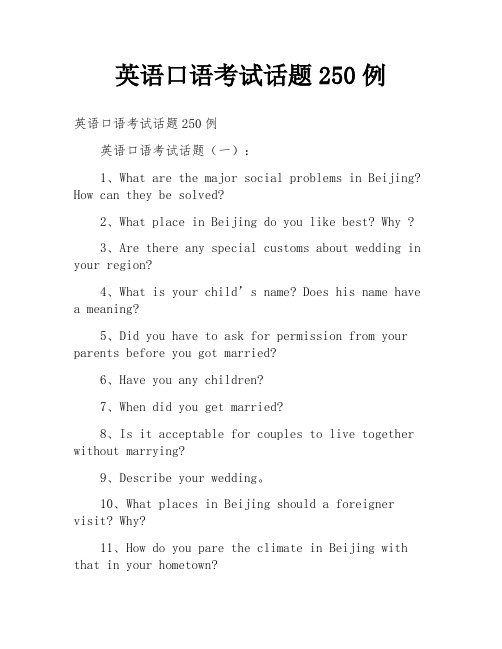
英语口语考试话题250例英语口语考试话题250例英语口语考试话题(一):1、What are the major social problems in Beijing? How can they be solved?2、What place in Beijing do you like best? Why ?3、Are there any special customs about wedding in your region?4、What is your child’s name? Does his name havea meaning?5、Did you have to ask for permission from your parents before you got married?6、Have you any children?7、When did you get married?8、Is it acceptable for couples to live together without marrying?9、Describe your wedding。
10、What places in Beijing should a foreigner visit? Why?11、How do you pare the climate in Beijing with that in your hometown?12、How have weddings changed in recent years?13、Where did you go for your honeymoon?14、What does your wifehusband do?15、Could you tell me something about your family?16、Which is the worst place you’ve been to China?17、Which is the best place you’ve been to China?18、Describe a traditional wedding ceremony。
英语口语考试常见话题及回答技巧

英语口语考试常见话题及回答技巧Title: Common Topics and Tips for English Oral ExamsIntroduction:English oral exams are a great way to test a student's ability to communicate effectively in English. These exams often cover a variety of topics, which can range from personal experiences to global issues. In this article, we will discuss some of the common topics that may come up in an English oral exam and provide tips on how to effectively respond to them.Common Topics:1. Personal Experiences:One of the most common topics in English oral exams is personal experiences. You may be asked to talk about a memorable event, a favorite holiday, or a significant achievement in your life. When talking about personal experiences, it is important to be detailed and descriptive. Use vivid language to paint a picture for the listener and keep the conversation engaging.Sample Answer:One of the most memorable experiences in my life was when I traveled to Japan last summer. I was fascinated by the rich culture, delicious food, and beautiful scenery. I even tried my hand at making sushi, which was a challenging but rewarding experience.2. Hobbies and Interests:Another common topic in English oral exams is hobbies and interests. You may be asked to talk about a hobby you enjoy, why you like it, and how it has influenced your life. When discussing your hobbies, be enthusiastic and passionate. Share specific examples or anecdotes that demonstrate your love for the activity.Sample Answer:One of my favorite hobbies is photography. I love capturing the beauty of the world through my camera lens and expressing my creativity through the art of photography. Whether it's a breathtaking landscape or a candid portrait, photography allows me to see the world in a new light.3. Current Events:English oral exams may also include questions about current events or global issues. You may be asked to discuss a recentnews story, a social or political issue, or a trending topic in the media. When talking about current events, be informed and objective. Present both sides of the issue and don't be afraid to express your opinion.Sample Answer:One current event that has caught my attention is the ongoing climate crisis. As global temperatures continue to rise, the impact on our planet and future generations is becoming more evident. It is crucial for individuals and governments to take action to reduce carbon emissions and protect the environment for future generations.Tips for English Oral Exams:1. Practice Speaking:One of the best ways to prepare for an English oral exam is to practice speaking. T...文章内容仅供参考。
英语口语考试常见问题及回答
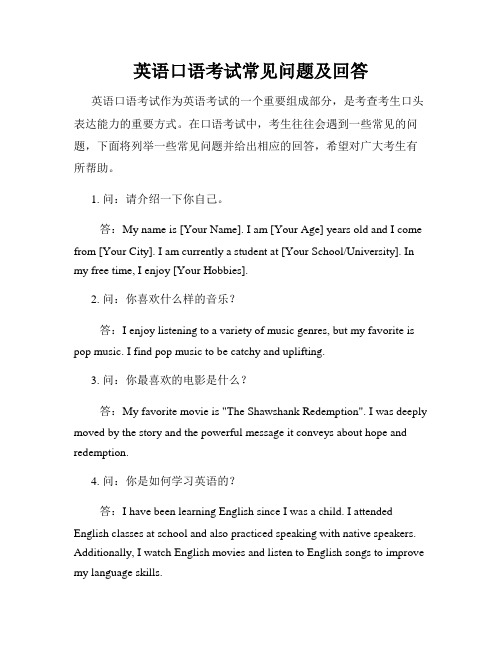
英语口语考试常见问题及回答英语口语考试作为英语考试的一个重要组成部分,是考查考生口头表达能力的重要方式。
在口语考试中,考生往往会遇到一些常见的问题,下面将列举一些常见问题并给出相应的回答,希望对广大考生有所帮助。
1. 问:请介绍一下你自己。
答:My name is [Your Name]. I am [Your Age] years old and I come from [Your City]. I am currently a student at [Your School/University]. In my free time, I enjoy [Your Hobbies].2. 问:你喜欢什么样的音乐?答:I enjoy listening to a variety of music genres, but my favorite is pop music. I find pop music to be catchy and uplifting.3. 问:你最喜欢的电影是什么?答:My favorite movie is "The Shawshank Redemption". I was deeply moved by the story and the powerful message it conveys about hope and redemption.4. 问:你是如何学习英语的?答:I have been learning English since I was a child. I attended English classes at school and also practiced speaking with native speakers. Additionally, I watch English movies and listen to English songs to improve my language skills.5. 问:你觉得学习英语有什么难点?答:I think one of the challenges of learning English is mastering the pronunciation and intonation. It takes practice and patience to improve my spoken English skills.6. 问:你有没有去过国外旅行过?答:Yes, I have traveled to [Name of Country/City]. It was an amazing experience to immerse myself in a different culture and practice speaking English with native speakers.7. 问:你觉得学习英语有什么好处?答:Learning English has many benefits. It opens up opportunities for communication with people from different countries and cultures. It also enhances my career prospects and broadens my horizons.8. 问:你的未来计划是什么?答:In the future, I plan to further improve my English skills and pursue higher education or a career in an English-speaking country. I am excited about the possibilities that fluency in English can bring.以上是一些英语口语考试中可能会遇到的常见问题及相应的回答。
有哪些常见的英语口语考试话题
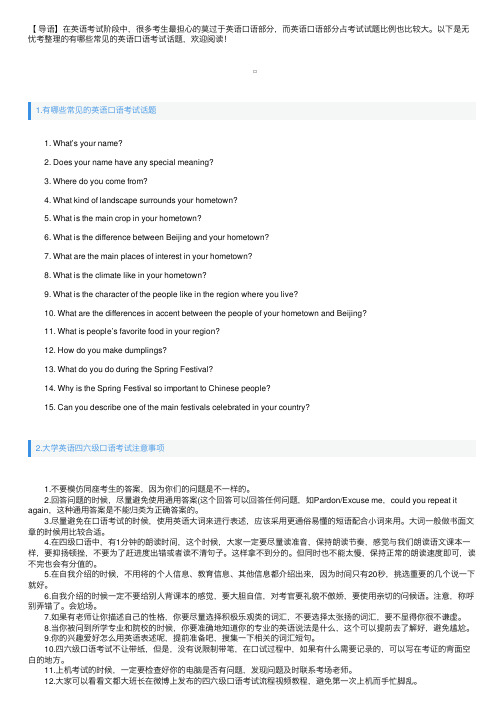
【导语】在英语考试阶段中,很多考⽣最担⼼的莫过于英语⼝语部分,⽽英语⼝语部分占考试试题⽐例也⽐较⼤。
以下是⽆忧考整理的有哪些常见的英语⼝语考试话题,欢迎阅读!1.有哪些常见的英语⼝语考试话题 1. What’s your name? 2. Does your name have any special meaning? 3. Where do you come from? 4. What kind of landscape surrounds your hometown? 5. What is the main crop in your hometown? 6. What is the difference between Beijing and your hometown? 7. What are the main places of interest in your hometown? 8. What is the climate like in your hometown? 9. What is the character of the people like in the region where you live? 10. What are the differences in accent between the people of your hometown and Beijing? 11. What is people’s favorite food in your region? 12. How do you make dumplings? 13. What do you do during the Spring Festival? 14. Why is the Spring Festival so important to Chinese people? 15. Can you describe one of the main festivals celebrated in your country?2.⼤学英语四六级⼝语考试注意事项 1.不要模仿同座考⽣的答案,因为你们的问题是不⼀样的。
英美文化15个话题

1.What different ethnic(民族的)groups are there in UK? Why are there so many? Where do they live? How are they different from the majority of people: language? Clothing? Music? What effect do different ethnic groups have on a country?different ethnic groups:(1)English people:The English are an ethnic group native to England, who speak the English language.(2)Scottish people:an ethnic group native to Scotland(3)Irish people:The Irish people are an ethnic group who originate in Ireland.(4)Welsh peopleWhy are there so many?The late 3rd century, the Pits invaded Britain’s north of Hadrian’s Wall.In the 6th century, the Scots settled in Pitish territory.In the mid-5th century, a new wave of invaders Jutes, Saxons and Angles came to Britain.From the end of the 8th century, Viking and Danish attacked England. With the development of industry and the process of Economic Globalization, Britain keeps receiving more and more citizens of the whole world, as a result of which, the peoples and culture in Britain will be increasingly colorful.Where do they live?England people live on the central and southern two-thirds of the island of Great Britain, plus such offshore islands as the Isle of Wight and the Isles of Scilly. Scotland people live on the mainland of Scotland which lies off the north-west coast of Continental Europe.Northern Ireland people live on the north-east of the island of Ireland,shares a border to the south and west with the Republic of Ireland.Wales people live on the Welsh Peninsula(威尔士半岛).Scottish Gaelic, the Celtic language historically restricted to most of the Highlands. About 80000 people still speak this old Celtic language, with most living on coastal islands and north-western HighlandsScottish kilt :A knee-length garment with pleats(褶)at the rear(背面), originating in the traditional dress of men and boys in the Scottish Highlands of the 16th century. It is most often made of woolen cloth in a tartan(花格)pattern.Different ethnic groups have on a country can promote the exchange of different cultures,but it Easily lead to ethnic conflict.1.How would you describe the traits(特点) of the people in Britain? Mainly from two aspects: (1) appearance & (2)character(1)Appearanceruddy complexion(红润的肤色);white;plump(胖乎乎的、丰满的);athletic(健壮的);chiseled face(脸部轮廓分明)(2)Character(& examples)✓Conservative保守的(British still uses mile, instead of metric system 公制;still keeps the monarchy君主制)✓Polite(It can be seen from their conversation. For example, “I don’t really like to ask you, but…”)✓Aloof and quiet冷漠安静(In the morning subway, people just read their newspaper, seldom talk to each other.)✓Humorous✓Privacy and individualism注重隐私、个人主义(My home is my castle. The wind can come in, but the Kings and Queens and human beings can never come in without my permission.)2.Do you think people all over the world are basically the same orbasically very different?As a famous going says, “You can not find two leaves which are exactly the same in the world.” That is like you and me. Neither the same nor very different, people are similar in some ways and different to some extent.For examples, everyone has a name. All names are symbols. And people all over the world wear clothes which are different, but it shares a same purpose, that is, to keep out of the cold or to be beautiful.(More examples: food,house,transport,faith…)3.How are the British people different from Chinese?Aspects: appearance, body, (略)eating habits, traits✓Eating habits:(中国)Three meals a day,; Rice &noodles ; Dishes in one plate, using chopsticks ; Sit around a big table(英国)Four meals a day, afternoon tea; Bread& Italy noodles ; Using spoons,knives & forks✓Different traits:(中国) Nervous&hard-working; Generous; Hospitable热情好客的(英国)Conservative; Polite; Aloof and quiet; Humorous; Privacy and individualism1.How religious are the British?✓Key words:multi-faith 宗教多元化; secularised世俗化; post-Christian后基督教Forms of Christianity have dominated religious life in what is now the United Kingdom for over 1,400 years.Immigration and demographic change have contributed to the growth of other faiths, most notably Islam since the middle of the 20th century.✓Data:(信仰宗教的人数比例)In 2001, Christians 71.6%; Islam 2.8%; no religion 15%In 2011, Christians 59.3%; Islam 4.8%; no religion 25%✓Changes:A survey in 2007 showed only one in ten Britons actually attend churchweekly.Half of the Muslims are less than 25 years old,but about a quarter of the Christians are nearly 80 years old.So it is estimated that the number of Muslims will be higher than Christians in 20 years.2.What major religious beliefs are there in Britain?The major religious beliefs are Christianity and Islam.The official religion in Britain is Christianity as practised by the Anglican Church. Followers of this branch of Christianity are known as Protestants(新教徒) and make up the majority of the population, although there are also many Catholics.Christians constitute about 71% of the population, but Britain is a multi-faith society and all other religions, including:Islam, Hinduism,Buddhism, Judaism and Sikhism. About 23% of Britain follow no particular religion.3.What are the differences and similarities between them? Differences:The biggest difference lies in the recognition of God to the chosen people.(最大的区别在与上帝对选民的认同) The Christianity think that the Christi ans have the priority to be chosen. Islam doesn’t favor certain people for they think that all men are equal. Similarities:They have a common origin, a common ancestry, a common shrine(圣地)People say that a history of Britain is a history of invasion. Do youagree or disagree? Find evidence to support your view. Please be specific and go down to the details.I claim that the invasion includes being invaded and invasion. So, from this angle, I agree with the view that a history of Britain is a history of invasion.1.Being invaded:Before the English Bourgeois Revolution(英国资产阶级革命), Britain had been invaded by other countries for a long time.✓The First Invader: Evidences show that the first settler of Britain is the Iberian(伊比利亚人) from the Iberian Peninsula(半岛), who lived there for a very long period. After years of peace, here came the first invader, the Celts(凯尔特人). It was about 5th century BC, when the invader killed the Iberian and made Celtic the daily language.✓Roman Conquest: In BC 55, Julius Caesar(凯撒大帝) tried several times to conquer the Celts,but failed. However, the Celts didn't escape from the government of the Romans. Only 12 years later, the Romans managed to conquer Britain by its army. A new ruler usually means a totally different life style. The language, the custom and the culture changed irresistibly.✓German Conquest(日耳曼征服): In 407, the Romans left Britain for their own reason, after which, the Jutes(朱特人), the Angles(盎格鲁人) and the Saxons(撒克逊人) became the new governor. The three tribes(部族) all spoke West Germanic languages(西日耳曼语), but different dialects, together they fostered the Old English.✓Scandinavian Conquest(斯堪的纳维亚征服):From 787 on, invaders from Scandinavian Peninsula, mainly the Danish(丹麦人) and the Norwegians(挪威人) , have continuously fought Britain for centuries.At the end of 10th century, the Danish and the Norwegians was the governors of Britain actually. Furthermore, in the early 11th century, Britain even became a part of the Danish empire. As a result, the Scandinavian culture, which develop in the northern Europe, greatly effect British culture.✓Norman Conquest(诺曼征服): Edward, the great king of Britain, died in 1066. He didn’t have a son, so it led to an argument of who was to be the successor. William the Conqueror(征服者威廉), who led his army against Britain, finally became the winner.William is actually a conqueror, because he made Britain varied much. For instance, to strengthen the central crown(中央王权), he made strict laws and even pulled down the castles of the Saxons. Years later, there was only two Saxon castles left. Besides, the Normans spoke French, making French and English interact with each other. So we can see so many French words in English today.✓The Great Transform: Being invaded for many times, Britain haddeveloped indeed. As we know, culture spears when different ones meet. Every time there was a conquest, every time there was a chance to improve. After a long history of being conquered, of learning and developing, Britain have gathered enough knowledge and power, to be an invader.The victory at the war against Spanish Armada(西班牙无敌舰队) in 1588 was a turning point. From then on, Britain gradually became the world’s biggest Colonizing Nation(殖民国家)—— The Empire on Which the Sun Never Sets.2.Invasion:With the development of the economy and society, British had become more and more aggressive.✓In 1600,The British invaded India.✓The British who built “Trap slave station"(捕奴站) in Gambia冈比亚)had expanded colonies crazily after 1688.✓In the middle of the nineteenth century, the United Kingdom conquered Myanmar and Malaysia as well as despoiled "The Dutch colonial" in South Africa. In Oceania, they conquered a great quantity of islands like New Zealand and put them all into the territor y of the British empire.✓In 1840 the British launched the first Opium War.(第一次鸦片战争)✓In 1854, the Crimean War(克里米亚战争)was a conflict in which Russia lost to an alliance of France, Britain, the Ottoman Empie, andSardinia. The immediate cause involved the rights of Christian minorities in the Holy Land, which was controlled by the Ottoman Empire.✓ 1856-1860 the British launched the second Opium War.✓In 1900 the UK joined Siege of the international Legations.In China:In nineteenth century, the British gained a lot of wealth in China through the same measure——doing the opium trade. After Lin Zexu banning the opium in Humen, the British waged the first Opium War in 1840 and the result of the war was Treaty of Nanking(南京条约), which Britain could get the power of controlling Hong Kong.In 1856,Britain invaded the Qing Dynasty in the second time and burned The Old Summer Palace with France. And in 1900,the British joined Siege of the International Legations(八国联军)and invaded the Qing Dynasty in the third time. During these three wars, Britain gained a number of money and rare historical relics form China.Sun-never-setting empire: how it started, proceeded, and declined, and its impact on world civilization. Try to make it specific. You can view the empire from a special perspective, for example, you can talk about the topic in terms of tea. Of course, this is just a suggestion.1.Start:(Mercantilism:重商主义)2.Proceed:The Britain became the Sun-never-setting empire in the middle of eighteenthcentury.3.Decline:After the end of 19th century, the British began to go downhill.✓The Britain didn’t seize the opportunity of the second industrial revolution. But at this time, other countries developed quickly, such as Germany and America.✓The impacts of the two world wars✓Capitalist(资本主义)economy depression✓Independence Movement: Irish war of independence; India war of independence✓In 1997,Hongkong return to China, which indicates the funeral of the empire.4.Influence:6.Make a study on the evolvement of the British Constitutional Monarchy(君主立宪制) by describing how power has been shifted转向from the Monarch 君主to the Lords 上议院and then to the Commons 下议院.对英国君主立宪制的演变,描述了如何权力已转向从君主到上议院,然后下议院(一)What is Constitutional Monarchy?1. Differs from absolute monarchy(君主专制)2. A form of government3. a monarch acts as head of state(君主作为国家元首)4. sole source of political power政治权力的唯一来源5. monarch bound by constitution君主受宪法约束When?什么时候开始Since 1689 the Glorious Revolution (光荣革命)parliament(议会)passed <<the Bill of Rights>>(<<权利法案>>) ——It limits the power of the king and ensure the parliament legislative authority(立法权)and financial power(财政权).——the parliament not only holds the legislative authority, but also have the right of supervision(监督权)for the government.Why?political basis:England(英国)the Glorious Revolution of 1688limits on the power of the monarch(限制君主权利)economic base:Age of Discovery大航海时代the capitalist class 资本家阶级political rights政治权利Although a series of laws are created to limit the power of the king ,itdoesn't meant that the king loses all the power.partial legislative authority(部分的立法权)He has the last power on the Proposed Law(法案否决权)diplomatic power(外交权)and so on(二)权力如何从君主转向上议院,然后到下议院the House of Lords(上议院) has advantages over the House of Commons (下议院)the House of Lords control the structure of senator of the House of Commons上议院他众议院控制下议院的参议员结构They have the same profit它们具有相同的利益the House of Lords take control of the government. 上议院控制政府the House of Lords has a good relationship with the king.上议院与国王的良好关系the House of Lords is mainly consist of clergy(神职人员) and nobility. They have the superior status because they have a lot of land. They are lording the political life.上议院主要由神职人员和贵族组成他们有优越的地位,他们有大量的土地。
英语口语能力测试话题(清晰版-22个话题全)
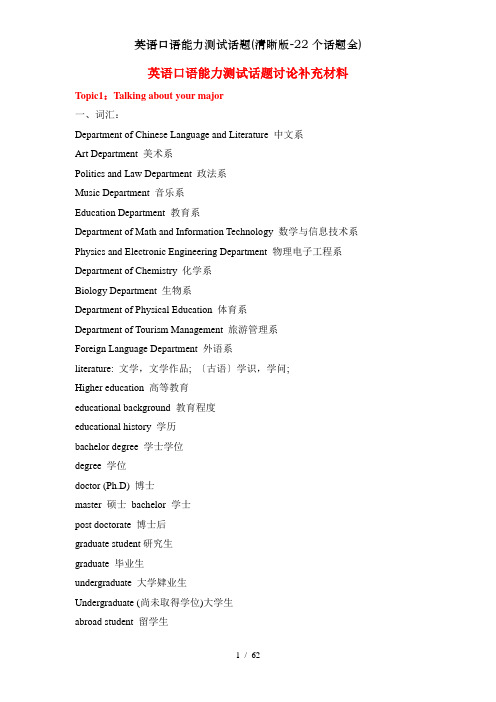
英语口语能力测试话题讨论补充材料Topic1:Talking about your major一、词汇:Department of Chinese Language and Literature 中文系Art Department 美术系Politics and Law Department 政法系Music Department 音乐系Education Department 教育系Department of Math and Information Technology 数学与信息技术系Physics and Electronic Engineering Department 物理电子工程系Department of Chemistry 化学系Biology Department 生物系Department of Physical Education 体育系Department of Tourism Management 旅游管理系Foreign Language Department 外语系literature: 文学,文学作品; 〔古语〕学识,学问;Higher education 高等教育educational background 教育程度educational history 学历bachelor degree 学士学位degree 学位doctor (Ph.D) 博士master 硕士bachelor 学士post doctorate 博士后graduate student研究生graduate 毕业生undergraduate 大学肄业生Undergraduate (尚未取得学位)大学生abroad student 留学生returned student 回国留学生foreign student 外国学生intern 实习生freshman 大学一年级学生sophomore 大学二年级学生;高中一年级学生Junior 大学三年级学生;高中二年级学生senior 大学四年级学生;高中三年级学生discipline 学科liberal arts 文科current major 目前专业occupation 职业specific专门的career生涯Engineer 工程师industries工业,勤劳medical science 医学education 教育economics 经济curriculum 课程major 主修minor 副修educational highlights 课程重点部分curriculum included 课程包括specialized courses 专门课程courses taken 所学课程courses completed 所学课程refresher course 进修课程physical activities 体育活动recreational activities 娱乐活动academic activities 学术活动social activities 社会活动rewards 奖励scholarship 奖学金Management 管理contribute 奉献potential 潜能opportunity 机会pursue 追逐secure安心的;不必担心的;有把握的Achieve达到(目的),实现Well-prepared 充分准备appreciate 欣赏二、短语:1. build…upon…. 把……建立于….上2. as a matter of fact = in fact 事实上,实际上3. with regards to regarding to 关于,至于4.not only…..but also…. 不仅….而且…..5.according to my major 根据我的专业6.be keen on sth. /doing sth. 喜欢做某事7.feel sick doing sth/dislike……讨厌做某事8.tend to be……趋向于成为…….9. give (full) play to (your potential) 充分发挥你的优势10.in addition 另外三、句子:1、What’s your major?你学什么专业的?2、My major is…/ I major in…我的专业是…3、It is useful/ practical. 这个实用。
- 1、下载文档前请自行甄别文档内容的完整性,平台不提供额外的编辑、内容补充、找答案等附加服务。
- 2、"仅部分预览"的文档,不可在线预览部分如存在完整性等问题,可反馈申请退款(可完整预览的文档不适用该条件!)。
- 3、如文档侵犯您的权益,请联系客服反馈,我们会尽快为您处理(人工客服工作时间:9:00-18:30)。
Chapter One: Understanding the Culture of the United States
1. Who established the dominant American culture?
Immigrants, most immigrants were from northern Europe, and the majority were from England. Their values and traditions became the dominant, traditional culture of the United States.
Chapter Two: Traditional American Values and Beliefs
2. What are the six traditional American values and beliefs?
Individual freedom and self-reliance,equality of opportunity and competition,material wealth and hard work。
Chapter Three: The American Religious Heritage
3. What is the most important heritage of Protestantism in the United States?
Self-improvement(p54)。
Material success,hard work。
Self-discipline。
Volunteerism and humanitarianism(人道主义)
Chapter Three: The American Religious Heritage
4. What is the “Protestant work ethic” according to our textbook?
The belief in hard work and self-discipline in pursuit of material gain and other goals is often referred to as …the Protestant work ethic‟.(p55 13)
Chapter Four: The Frontier Heritage
5. What does "frontier" refer to in American history?
American macho heroes. Inventiveness and the can-do spirit.
Chapter Four: The Frontier Heritage
6. What are the two new values derived from the American frontier?
Inventiveness and the can-do spirit. (p77)
Chapter Four: The Frontier Heritage
7. Why did the sale of guns rise after 9/11?
How Americans reacted to 911 reveals another legacy of the frontier: Americans‟ willingness to take the law into their own hands to protect themselves and their families. This tendency usually appears when Americans believe the police cannot adequately protect them.
Chapter Six: The World of American Business
8. Which values are reinforced(加强) in the American business?
Individual freedom, equality of opportunity, and hard work.
Chapter Seven: Government and Politics in the United States
9. What are the three branches of the American government? What are their powers respectively?(p142)
Congress is the legislative or lawmaking branch of the government.
The president, or chief executive, heads the executive branch, which has responsibility to carry out the laws.
The Supreme Court and lower national courts make up the judicial branch. The judicial branch settles disputes about the exact meaning of the law through court cases.
Chapter Nine: Education in the United States
10. Could you explain the sentence “American universities look for well-rounded students when they admit”?(p195)
Grades in high school courses and scores on tests like the sat are very important, but so are the students‟extracurricular activities. It is by participating in these activities that students demonstrate their special talents, their level of maturity and responsibility, their leadership qualities, and their ability to get along with others.。
